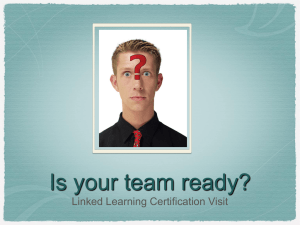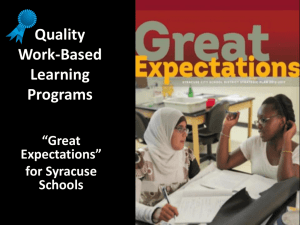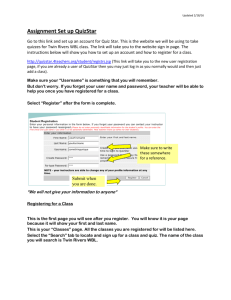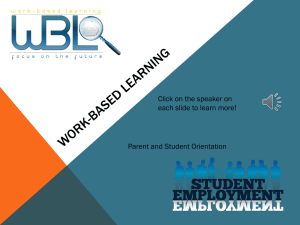Organic Molecules - Michigan Career Education Conference
advertisement
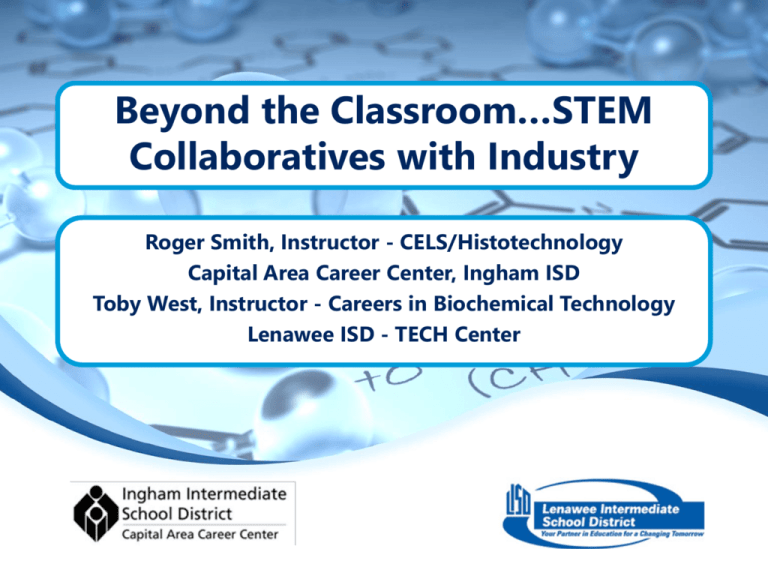
Beyond the Classroom…STEM Collaboratives with Industry Roger Smith, Instructor - CELS/Histotechnology Capital Area Career Center, Ingham ISD Toby West, Instructor - Careers in Biochemical Technology Lenawee ISD - TECH Center Career Education in Lab Science (CELS) & Histotechnology In the beginning there was Histology • • • • STEM before there was a STEM initiative Unique Highly successful Small class size Through Histology came CELS • • Broad overview of lab careers Serve more students CELS Curriculum Overview Careers in Biochemical Tech LISD TECH Center, Adrian MI • • • Program was established during 2007-08 school year Response to challenge from local chemical industry Promoting a variety of science careers for students of Lenawee County; Increase STEM Literacy Biochem Curriculum Overview An Equation for Success STEM CTE WBL Student Success in STEM Careers What is STEM? In its broadest sense, STEM is an initiative for securing America’s Leadership in science, technology, engineering, and mathematics fields and identifying promising strategies for strengthening the educational pipeline that leads to STEM careers.1 The Need for STEM Professionals • Economic Competitiveness • The Baby Boom Retirement • • 26% of workers with science and engineering degrees are over the age of 50.2 Students Earning Fewer Degrees Students Earning Fewer Degrees Engineering Degrees Earned in 1985 & 2005 80,000 60,000 40,000 20,000 0 1985 BS Degrees Earned 77572 AS Degrees Earned 53700 2005 66133 28800 1985 2005 Why are Students not choosing STEM Careers? • Lack of Foundational Skills • • • U.S. NAEP test scores showed no improvement in math from 2004-2008 among 17 year olds despite students taking higher level math classes.3 U.S. students are consistently scoring below students from other industrialized countries in science and math.4 Lack of STEM Understanding • Surveyed students reported lacking knowledge of STEM careers.5 Project Lead the Way™ • • • • Nationally recognized curriculum to promote skills and careers used in science/engineering Curriculum used throughout Lenawee County Biotechnical Engineering Curriculum used in Biochem at LISD TECH Center Stress skills AND academics in a unique way. Perfect for CTE programs How can CTE Provide a Solution? • CTE Integrates Technology with High Level Academics • • • Students are earning math and science credits in their programs along with college credits CTE presents STEM content differently from “normal” academic courses Work Based Learning Opportunities What is Work Based Learning? Work-Based Learning (WBL) gives students the opportunity to learn a variety of skills by expanding the walls of classroom learning to include the community. By narrowing the gap between theory and practice, Work-Based Learning creates meaning for students.6 How WBL is Utilized in the Careers in Biochemical Technology Program Biochem Connections with Industry Important to establish strong industry connections to promote science careers Partnered with: SouthCentral Michigan Works • Lenawee Economic Development Corp. • Advisory Committee Members • Personal Connections • Industry Experiences for Students Co-op with Jackson Community College Field Trips/Job Shadow Experiences: Bixby Hospital • Wacker Chemical • Neogen Corp • TransPharm • Wheelock Pharmacy • Adrian Water & Wastewater Treatment Plant Laboratories • Jackson Community College / LISD • • • • • Laboratory Tech Co-op Competitive 2nd yr experience Paid Lab prep for chemistry, microbiology, Gen biology classes for JCC @ LISD TECH campus Great experience for students! Jackson Community College / LISD • • • • Great relationship Students get lab experience Students receive soft skill development Instructors benefit Groeb Farms, Inc. • • • • One of nations largest honey processors (Onsted, MI) Instructor training on pesticide & antibiotic testing in honey Testing above government regulations 5 students trained Groeb Farms, Inc. • • • Students involved in production testing of honey Students were paid for their labor during and after school hours Invaluable work experience, especially with record keeping. Great experience with lab notebook. Current Industry Connection: Greener Planet Solutions (a BioDri Michigan Company) • • • • Start-up technology company Development of many products PrO2 oxygen delivery system for wastewater treatment; has most immediate market potential Instructor was hired as part-time consultant GPS / LISD Partnership Development of partnership between LISD and GPS Win – Win • • GPS gets a lab to help with technical data development LISD gets work experience for students Lessons Learned Success: • • • • Great work experience for students Students received great soft skill development (communication & record keeping) Insight into today’s business world Help local companies grow! Challenges • • • Major Pitfall: R&D / Technical vs. Production testing! Make sure you work with administration to have contract in place that protects the school and student Liability, OSHA responsibilities, & safety training How WBL is Utilized in the CELS/Histotechnology Program WBL in CELS/Histotechnology • • • • Need for New Affiliates How we Obtained new WBL Sites Information to Think about When Contacting a New WBL Site Before, During, and After the WBL Experience The Need for New WBL Sites • The CELS curriculum is much more broad than the Histotechnology program. • Broad Overview of Lab Careers Current Affiliates • • • • • • • • MSU Investigative histopathology Laboratory MSU Diagnostic Center for Population and Animal Health Sparrow Hospital Histopathology Laboratory Capitol Area Pathologists Histology Laboratory Allegiance Health Hospital Histology Laboratory U of M Hospital Histology Laboratory St Joseph Ann Arbor Histology Laboratory Borgess Research & Hospital Histology Laboratory • • • • • Hurley Medical Center U of M Research Institute St. Mary’s Hospital Histology Laboratory Lansing Urology Histology Laboratory Genesis Diagnostic Histopathology Laboratory Its Not What You Know, Its Who You Know……… Medical Laboratory Institution Clinical Lab Molecular Lab Micro Immuno Hematology PA’s Anatomic Lab PCR Path’s HT’s Cytogen Electro Making Connections with New Departments • Contacts for lab personnel • • Advisory committee members as references Advisory committee members to approach new departments • Personal testimonies Before Contacting New Sites • Draft a letter to include • • • • • • Information about your program Training Student Background Students outcomes Observers vs Workers Time period Information to Think about when Contacting a New WBL Site • What limitations? • • • • Transportation • • Vaccinations Insurance Age requirements Can they drive themselves? Environment • Is it appropriate for the student you are sending? Before, During, and After the WBL Experience Before the WBL Experience • Documentation Required from Students • Medical Release Form • • • • • • Photocopy of immunizations Negative TB Test Tetanus Booster Emergency Contact Information Documentation of Health Insurance Transportation • Copy of driver’s license Before the WBL Experience • Student Preparation • • • • Expected behavior Work attire Directions to site Ensure students have folders containing WBL documents: • • • • • Immunizations Personal health insurance Emergency contacts Attendance forms Assignments Before the WBL Experience • Communication is key! • • E-mail, Phone, Dropping In Before the visit • • Confirm dates, times, meeting places Confirm with both the site and the students During the WBL Experience • Instructors/WBL Specialists • • • Be available! Potential problems WBL sites complete student evaluation After the WBL Experience • Debrief Students • • Students complete: • • • • Classroom discussion Skills log Reflective Questionnaire Thank you letters to mentor Communicate with the site References 1. Alliance for Education, “S.T.E.M.,” www.sbcalliance.org/stem.htm 2. National Science Board, Science and Engineering Indicators 2008 (Arlington, VA: National Science Foundation, 2008) 3. Zehr, Mary Ann, “Older Students Less Successful on Math NAEP,” Education Week 28, no. 31 (April 28, 2009) 4. U.S. Department of Education, National Center for Education Statistics, The Nation’s Report Card: Long-Term Trend 2008 (Washington, DC: U.S. Government Printing Office, April 2009) 5. Organization for Economic Co-operation and Development, “PISA 2006: Science Competencies for Tomorrow’s World Executive Summary,” 6. http://schools.utah.gov/cte/wbl.html Any Questions? Contact info: Roger Smith, Instructor - CELS/Histotechnology rsmith@inghamisd.org Toby West, Instructor - Careers in Biochemical Technology toby.west@lisd.us
